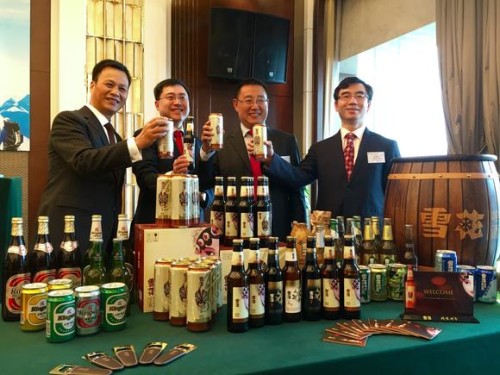China Resources Beer is counting on the premium segment to boost margins as the country’s sluggish economy and intense market competition has hurt beer sales.
 Full-year underlying profits for the group’s beer assets increased 14% to HK$831 million ($101 million), partly helped by a 3.2% increase in its average sales price. Revenue slowed to 1% growth, reaching HK$34.8 billion in the 12 months ended December.
Full-year underlying profits for the group’s beer assets increased 14% to HK$831 million ($101 million), partly helped by a 3.2% increase in its average sales price. Revenue slowed to 1% growth, reaching HK$34.8 billion in the 12 months ended December.
The higher profit in its beer business came in spite of a 1.3% fall in sales volume on the year. Meanwhile, the group saw a 15% rise in sales volume from its mid-end and premium sector, which now accounts for more than 45% of the total.
Earlier in March, CR Beer agreed to pay a less-than-expected $1.6 billion for SABMiller’s remaining 49% stake in the brewer behind the world’s best-selling Snow beer — China Resources Snow Breweries, which was a joint venture between the two brewers.
Vincent Tse, investor relations director at CR Beer, said the deal was based upon a “friendly price” after “arm’s length negotiation,” adding that the brewer would not rule out future cooperation with SABMiller and plans to seek overseas partnerships.
While the deal is awaiting regulatory approval and is scheduled to close at the end of this year, Guotai Junan Securities maintained a “neutral” rating for CR Beer on Mar. 2. “The deal is not likely to ease the already intense competition and room for a hike in average selling price is limited in the Chinese beer industry,” said Andrew Song, an analyst at the Chinese brokerage.
“Growth has been difficult for the beer industry, but the premium sector is still growing,” Jason Hou, general manager at China Resources Snow Breweries told reporters on Friday. The brewer has a “low single-digit” growth target for its sales and average selling price in the coming year, he added.
CR Beer changed its name from China Resources Enterprises after it sold non-beer assets including the loss-making Tesco stores to its unlisted parent China Resources Holdings in September for $3.6 billion. Its underlying losses of discontinued operations, including retail, food and beverages, surged more than threefold to HK$5.65 billion from a year earlier.
The beer market in China is highly competitive. CR Beer had a 23% market share in 2014, with Tsingtao Brewery second at 18%, according to market research group Euromonitor International. The rest is divided between major brewers such as Beijing Yanjing Brewery, Anheuser Busch InBev, Carlsberg and a handful of smaller players.
But others say the beer sector in China still has room for margin expansion and “premiumization” — a trend that has seen more wealthy consumers trading up to more expensive brands of alcohol.

